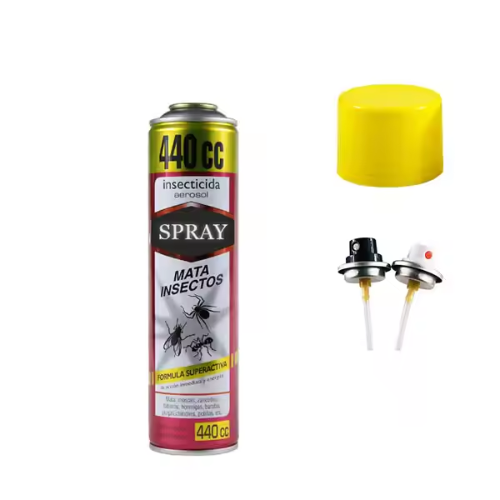Aerosol products, because of their ease of use and wide range of applications, are increasingly entering various industries and people's daily lives. Aerosol products are divided into tinplate cans, aluminum cans and plastic cans according to their packaging, among which tinplate cans are the most widely used and the phenomenon of corrosion inside the cans is also the most common.
Every year due to corrosion caused by the leakage of aerosol products through the cans of the phenomenon occurred from time to time, the loss is huge, because of the complexity of the cause, the empty can manufacturers, filling manufacturers, businesses, users can not clearly define the responsibility, often can not be concluded, each assessed part of the loss of the matter, in fact, the corrosion of the aerosol can be prevented through the standardization of formulations, processes, and do a good job of stability testing.
1. Types of corrosion
(1) Even corrosion
Such as alkaline detergent and no internal coating of tinplate cans inside the tin-plated layer in contact with the complete de-tinning terminated.
(2) Pit corrosion and perforation
Localized dissolution of the metal leads to perforation.
(3) Fracture corrosion
Top, bottom cover and can body connection, easy to form a stagnant area, the contents of the existence of electrolyte concentration effect, easy to cause crevice corrosion.
(4) Electro-coupling corrosion
Can body of copper welding weld, due to the destruction of the tin layer, copper and iron electrode potential difference, in the presence of electrolyte, contact and produce galvanic coupling corrosion, although the weld has a complementary protective layer, but the electrolyte can arrive at the surface of the metal layer through the protective layer, the formation of corrosion batteries, resulting in corrosion.
(5) Stress corrosion
Forming deformation of the stress exacerbates the distortion, causing corrosion at the cracks, such as aluminum cans.
(6) Sub-membrane corrosion
Under the organic film or in the surface treatment film under the metal surface of the horizontal direction of the expansion of corrosion.
Formulator in doing product stability testing, less concerned about the above classification, generally according to the gas-phase corrosion, liquid-phase corrosion, gas-liquid interface corrosion to describe, and according to these three phenomena to select the appropriate corrosion inhibitor, adjust the formula.
2. from the formulation design to prevent corrosion of aerosol products
(1) tinplate cans for oil-based (solvent-based) aerosol products
General pure solvent-based formulations, no need to add corrosion inhibitors, corrosion will rarely occur, but there are exceptions, if the oil-based LPG pesticide batch leakage may be the cause of kerosene or LPG raw materials mixed with a trace amount of water, filling into the product, moisture to make some insecticidal active ingredient hydrolysis or kerosene impurity reaction, the precipitation of acid substances leading to corrosion of the can.
Solution:
① Measure the moisture content of the raw material, ensure that the moisture content is less than 100ppm.
② Add some water-soluble solvents, such as isopropyl alcohol, ethanol, etc. to disperse the trace water in the oily solvents and LPG, to prevent gathering and settling at the bottom.

(2) Alcohol-based aerosol products in tinplate cans
Early air freshener formulations consisted mainly of flavors, anhydrous ethanol or isopropanol, LPG or DME. General. There is no need to add corrosion inhibitors to these products, and if 95% ethanol is used, 0.1% sodium benzoate can be added.
(3) Water-based aerosol products for tinplate cans
For tinplate cans without internal coating, general water-based products, the best PH control in 7.0 ~ 9.0, according to the functional requirements of the product, choose to add 0.1-0.2% of the gas-phase and liquid-phase corrosion inhibitors, such as sodium benzoate, sodium nitrite, triethanolamine, ammonia, phosphoric acid dihydrogen amine, morpholine and so on. The use and dosage of sodium nitrite should be carefully selected, as it may be counterproductive if there are ingredients in the formulation that oxidize sodium nitrite to sodium nitrate.
For tinplate cans with internal coating, the product PH should be controlled above 5.5, but not to use DME as the ejection agent, because DME will dissolve the internal coating, causing it to flake off and not play a protective role, and the flaking of the internal coating may clog the suction tube, resulting in the product can not be sprayed.
When the PH of water-based products>10 or even PH 12 or above, strong alkali will make its tinplate cans without internal coating of the internal tin layer dissolved, the cans show a grayish-black, we call it “passivation layer”, this phenomenon is called “de-tinning”, is when the tin is dissolved, exposing a dark gray film. This phenomenon is called “de-tinning”, is when the tin dissolution, exposing a dark gray film of tin-iron alloy FeSn2, and strong alkali further reaction iron passivation into black, to prevent further corrosion. When a passivation layer exists, the product rarely corrodes through the can.
Selection of high-quality qualified aerosol cans, aerosol valves is an important factor in preventing product corrosion, because the regular manufacturers of tinplate cans selected by the raw materials are more compliant, the process of making cans will be more stringent control of stamping, slicing, internal coating, can body welding, two volume sealing and other process quality, the production of tinplate cans in terms of pressure resistance, airtightness and corrosion resistance will be more secure.In mgaerosolcan, we offer high quality aerosol tin cans. Tell us what you need and we are at your service!